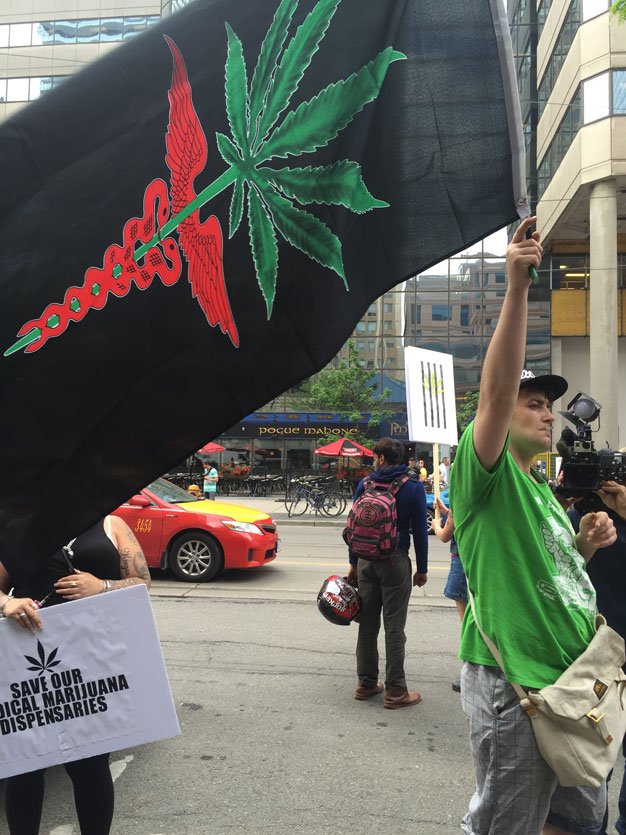
Raymond Hathaway, a Toronto paralegal who is suing the city for $1 million for interfering with his access to medical marijuana as a result of police raids on dispensaries back in May, doesn’t mince words.
“The raids are grand theft, destruction of property, and, from a patient perspective, criminal harassment on the basis of disability,” Hathaway says, eliciting applause from dozens of members of the public gathered in a committee room at City Hall Monday, July 25, to spark discussion on the future of marijuana dispensaries in Toronto.
Hathaway’s lawsuit centres around his inability to access Rick Simpson Oil, a cannabis extract that is currently not available through any of Canada’s 34 Licensed Producers of medical marijuana. This, he argues in his lawsuit, constitutes a violation of his human rights.
“Dispensaries are not in a grey area and are not illegal,” he says, pointing to several court cases supporting patient access to medical marijuana, including R. v. Parker, a 2000 Ontario Court of Appeal decision that found prohibiting cannabis use was unconstitutional because some illnesses require it for treatment.
The city’s Licensing and Standards Committee voted June 27 to defer a discussion on the licensing of dispensaries until provincial and federal legislation has been passed on the matter.
Councillor Jim Karygiannis, the only member of the committee to vote against deferral, organized the forum to hear from the 40 or so individuals who had registered to speak to the committee but ended up being turned away after its deferral decision.
The Scarborough-Agincourt councillor, who has gone after grow ops in his ward in the past, has emerged as an unlikely champion for those supporting a storefront model for legal marijuana, even as a federal task deciding how to move ahead with legalization has sent mixed signals on the future of street-level dispensaries.
Karygiannis, speaking to NOW Magazine in an interview later, says police raids that shutdown some 49 storefront locations in May, dubbed Project Claudia, “was a knee-jerk reaction to a couple of hundred emails that the mayor got.”
Quickly doing some calculations with input from forum participants, Karygiannis estimates that as much as $450,000 was spent on the raids, which ended in hundreds of marijuana edibles and some 270 kilograms of dried marijuana. Ninety people were arrested and some 186 charges laid in the raids.
Michael McLellan, volunteer representative for Toronto Dispensaries Coalition, a group which has been pushing “safe, sensible and reasonable” regulation of storefront operations, proposes licensing fees, criminal record checks for owners and a prohibition on consuming cannabis products on the premises.
Ian Dawkins, executive director of the Cannabis Growers of Canada, questioned why there seemed to be unreasonable scrutiny and speculation regarding the legality of dispensaries.
“The fact that the federal government has already said that [marijuana] should be legal, why are we still having this conversation?”
He pointed to Victoria as a model Toronto could follow. There, city council is currently in the process of reviewing a comprehensive list of licensing rules that would govern the 35 dispensaries in the city, giving them regulatory clout even before Ottawa forms a plan on how to legalize the drug.
“Victoria isn’t Mars it’s Canada,” Dawkins says.
Some at the City Hall forum suggested dispensaries could be a boon to the local economy. Using numbers from Colorado’s storefront model, Lisa Campbell of Women Grow Toronto estimates that dispensaries would raise some $30 million in annual tax revenues and licensing fees for the city.
However, not everyone in attendance supported a storefront model.
“I’ve yet to find a compassionate dispensary in Toronto,” says Konstantino Beltsis of the organization Patience First.
He argues that dispensaries focusing on profit instead of medpot patients make access to medical marijuana financially impossible, their prices too high for most individuals to afford. Even purchasing from a Licensed Producer would cost him $60,000 each year, he says.
Beltsis’ mother, also in attendance at the meeting, says six police officers showed up at her house once to confiscate the 11 marijuana plants she was growing for her son.
The city’s licensing committee is scheduled to meet again October 25 to look at the issue of storefront regulation.
news@nowtoronto.com | @nowtoronto












